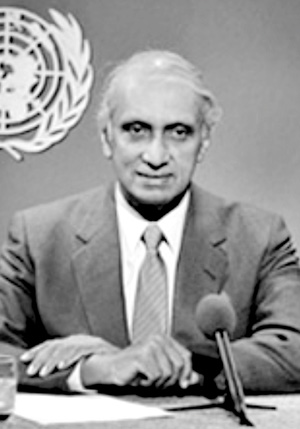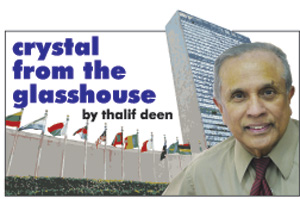Sunday Times 2
Gamani Corea wouldn’t touch top UN job even with a bamboo pole
View(s):Dr. Gamani Corea, an imposing figure both intellectually and physically, was one of the first Sri Lankans to hold the rank of Under-Secretary-General (USG), the third highest ranking position at the United Nations, after the Secretary-General and the Deputy Secretary-General.

Dr. Gamani Corea was critical of IMF policies which were weighing heavily on the world's poorer nations. Pic courtesy UNCTAD
A former senior Deputy Governor of the Central Bank and Permanent Secretary to the Ministry of Plan Implementation, he held the title of Secretary-General — not of the United Nations but of the UN Conference on Trade and Development (UNCTAD) — for 10 long years during 1974-84. But despite his strong credentials, he never aspired to the highest echelons of the world body.
Asked about a bitter feud in 1996 between the then UN Secretary-General Boutros Boutros-Ghali, who died last week in Cairo, and the United States over the Egyptian’s failed attempt to win re-election for a second term, Gamani provided one of his usually memorable quotes when he said he doesn’t know why anyone in his right mind would want that job.
And he certainly wasn’t going to touch it even with a 10 foot-long bamboo pole (forget barge poles). At the UN, Gamani was also best known for the key role he played in the creation of the Group of 77, the largest single coalition of developing countries, whose numbers rose from the original 77 in 1964 to the current 132.
And that was when Gamani was holding the post of Sri Lanka’s Ambassador to the European Economic Community (EEC) in Brussels — and long before he took over UNCTAD. An economist with two degrees from Oxford and Cambridge and a doctorate from Oxford, he had a love-hate relationship with international financial institutions, including the Washington-based World Bank and the International Monetary (IMF).
In the 1960s and 1970s, the IMF had notoriety for laying down rigid conditions on countries seeking concessional loans to tide over their budgetary problems. The conditions included devaluation of national currencies, removal of government subsidies, the privatisation of government corporations, downsizing of bureaucracies, reduction of budgetary deficits, and sharp cuts in military spending and government salaries. In the US, they are called the “third rail” in politics: you touch them and you are politically dead.
The one-sided negotiations were mostly with finance ministers struggling to balance national budgets and eventually caving into the demands of the IMF under what was called “Structural Adjustment Policies.” In Africa, which had the largest number of developing nations, there was an oft quoted story of how every visit by an IMF delegation was immediately followed by street riots by people protesting skyrocketing consumer prices and higher costs of living — triggered by IMF policies.
 Addressing a luncheon at the UN delegate’s dining room back in the late 1970s, Gamani was critical of IMF policies which were weighing heavily on the world’s poorer nations. But all developing nations, he said amidst laughter, had one thing in common: the IMF as its de facto Finance Minister.
Addressing a luncheon at the UN delegate’s dining room back in the late 1970s, Gamani was critical of IMF policies which were weighing heavily on the world’s poorer nations. But all developing nations, he said amidst laughter, had one thing in common: the IMF as its de facto Finance Minister.
And around the same time, New York Times columnist Tom Friedman recounted an anecdote in his new book on Globalisation about a newly-appointed Finance Minister being congratulated by a friend. ”Don’t congratulate me,” he tells the friend, “I am only half a minister. My other half is in Washington.”
At UNCTAD, Gamani initiated a series of international economic reforms, primarily to boost the development agenda of developing nations, focusing primarily on the 48 Least Developed Countries (LDCs), described as the poorest of the world’s poor.
His biggest push was for an Integrated Programme for Commodities and a Common Fund to help prop up the prices of commodities like tea, rubber, rice, soya beans and sugar on which most third world economies were dependent on.
Gamani also had the knack of conveying his message with a pointed sense of humour. At the historic 1992 Earth Summit in Rio de Janeiro, Gamani was co-opted as a member of the Sri Lanka delegation, although by that time he was no longer with UNCTAD.
The conference, one of the largest gathering of world leaders, was trying get a commitment from rich industrialised nations to help finance a global environment programme called Agenda 21.
Projecting into the 21st century, the plan of action was aimed at conserving and managing scarce economic resources, changing and reducing consumption patterns and protecting the global environment, including wildlife and nature, prompting cynics to describe environmentalists as “tree huggers.”
After nearly two weeks of intense late night discussions, the Earth Summit, the first in a series of major UN conferences beginning in the 1990s, was on the verge of collapse because of the refusal of rich nations to pledge any funds. As I was doing a wrap-up of the summit for a daily conference newspaper published by Inter Press Service (IPS), I buttonholed Gamani outside the meeting hall and asked him for a comment.
Having known Gamani from his days at the Central Bank when I was a cub reporter covering trade and commerce for the Ceylon Observer, I sensed I was likely to get a headline-grabber. And he did not disappoint me. “We negotiated the size of the zero,” he declared, summing up the conclusion of the much-ballyhooed summit.
The quote, not the summit, eventually turned out to be historic. The writer can be reached at thalifdeen@aol.com

